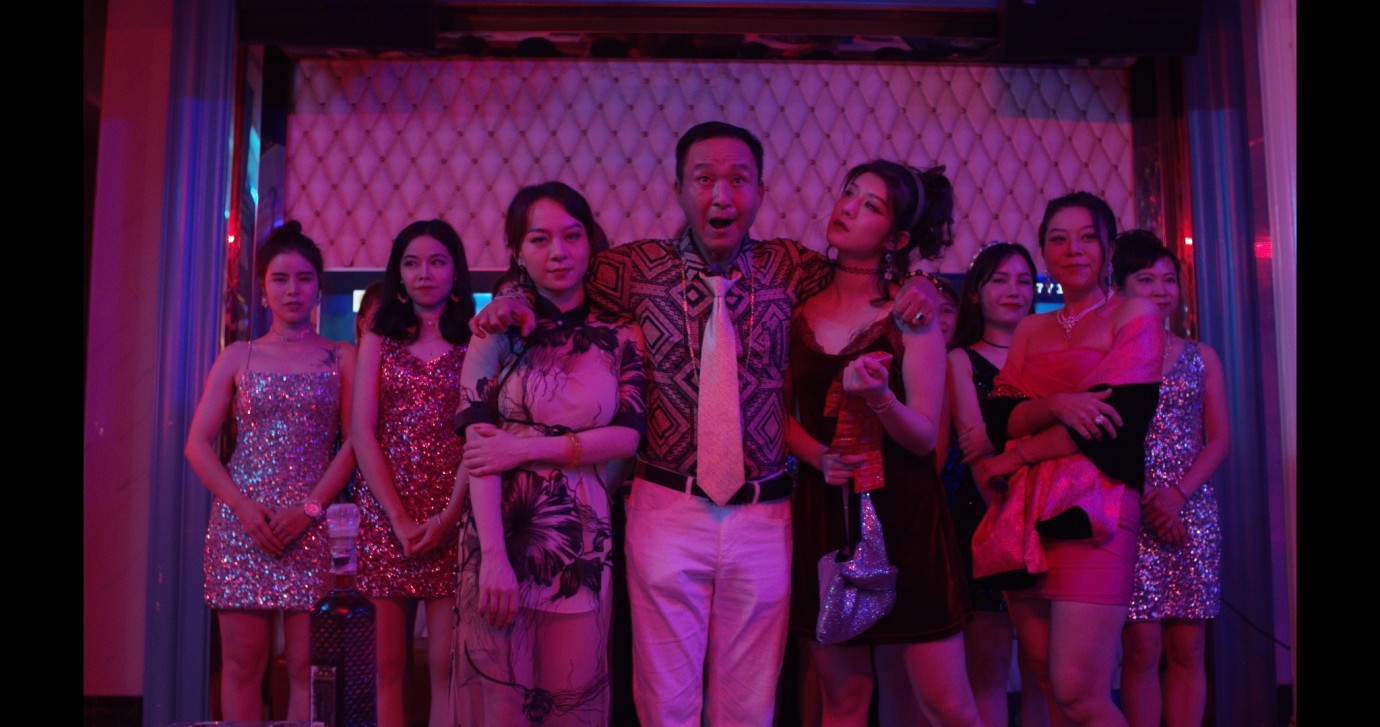by Brian Hioe
語言:
English
Photo Credit: All the Crows in the World/Film Still
The following film shorts were shown at this year’s Golden Horse Film Festival in Taipei.
GOOD DAY follows Chia-Chen, a man whose wife is filing for divorce, one day as he becomes locked outside of his home during a typhoon. The irony of the title, Yong-ching (詠晴) in Chinese, is that it is both the name of the typhoon and of the man’s wife.
In this respect, Good Day has a minimalist plot. The only characters that appear in the movie are Chia-Chen, his son, and his pet dog. The movie starts with Chia-Chen doing his laundry as the typhoon approaches and ends somewhat cyclically with Chia-Chen in the same place, after a long struggle back into his home through the window. That most of the movie follows Chia-Chen’s struggle to climb back into his home after being locked out reminds of “Say Your Name” the last segment of Taiwanese New Wave anthology film In Our Time.
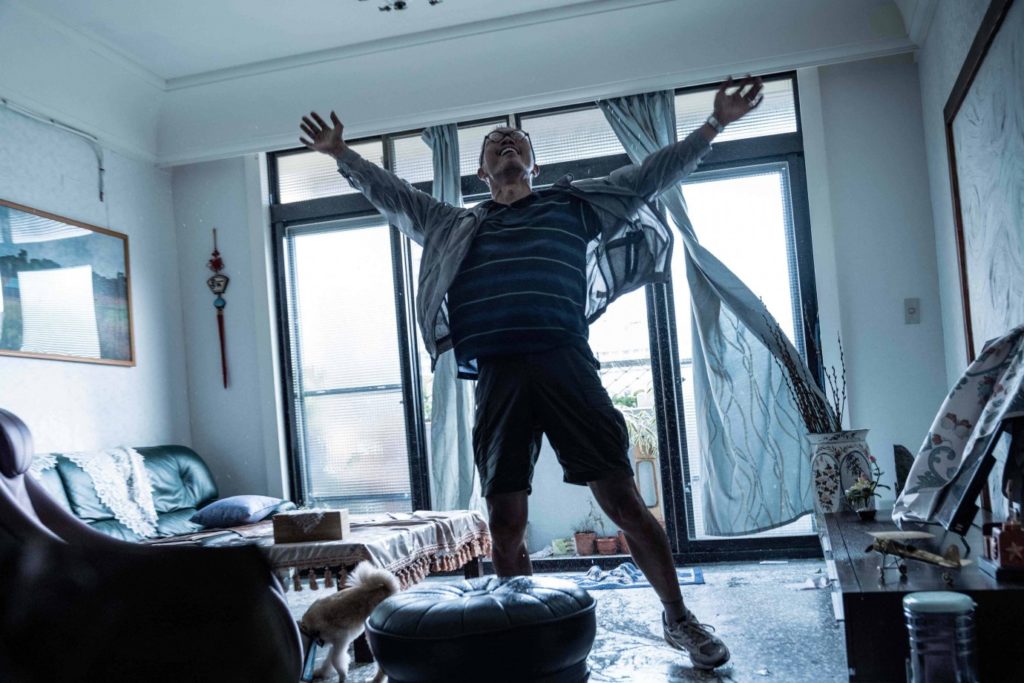
Film still
Chia-Chen’s characterization comes across quite strongly, despite the fact that he has only a few lines of dialogue in the film. Yong-ching, the typhoon and Chia-chen’s wife, then, are an unseen force that overshadows the plot as a whole.
This is carried out expertly by director Zhang Zhi-teng, who is perhaps best known as the cinematographer for the highly acclaimed 2015 film Thanatos, Drunk. The minor details of Chia-Chen’s actions, such as the opening scene in which he does his laundry while riding a hoverboard, add to the tapestry of the film. These elements come together for compelling effect.
If anything, Good Day is a capable film. It may not exactly be aiming at a complex plot, but it is a film that is more than the sum of its parts
NEKO AND FLIES is a short film that aims to depict bare existence in Kaohsiung, with a focus on individuals working in the fishing industry.
The film follows a man named Chuang, who works as a guard on a harbor housing a number of fishing vessels manned by migrant fishermen. Chuang tries to keep the peace between contending groups of Indonesian and Filipino migrant fishermen, while also protecting a prostitute working on the fishing vessel, referred to as Neko.
Neko and Flies aims to depict individuals who are social outcasts, in this way. Nevertheless, the plot is not completely successful. Viewers ultimately come away from the film with very little sense of what it is that motivates Chuang in his actions. Even more opaque are the migrant fishermen that appear in the film, who are depicted sympathetically, but come off as irrationally violent in their characterization. More generally, the focus of the film is the Taiwanese characters, while migrant fishermen simply provide a backdrop for drama between Taiwanese characters to take place.
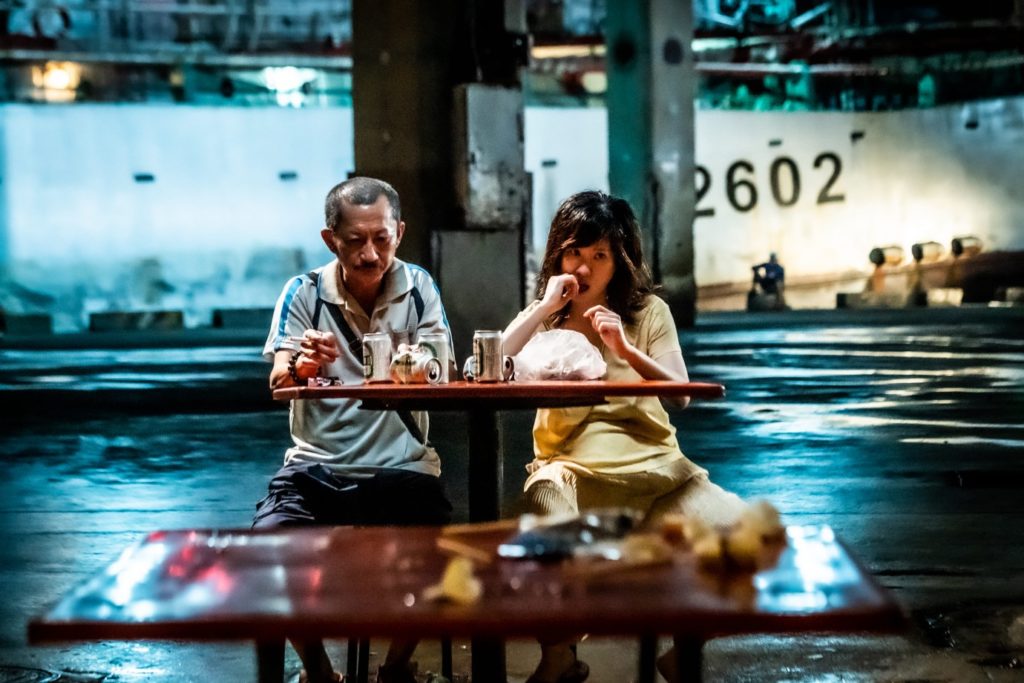
Film still
Where the film is more successful, it is in evoking the ambiance of harbor life in Kaohsiung. The film avoids a gritty aesthetic, while still depicting the harsh conditions of life for migrant fishermen, and those that work in related industries. The movie is frank with regards to the conditions of hand-to-mouth existence for migrant fishermen and other members of the working class.
The film particularly focuses on images of rotting fish on the harbor, as metaphoric for the lives of its characters. Nevertheless, it may also be a flaw of the film that it has no other message than that, with no particular commentary on the conditions faced by its characters. In this way, something about the film ultimately is wanting.
my sister is ultimately a melodrama, telling the story of high schooler Hsiao-chun on the eve of her departure for college.
The film shows Hsiao-chun going about her part-time job, spending time with her boyfriend, and awaiting college entrance exam results. In particular, the film focuses on her relationship with her family, particularly her somewhat distant parents and her younger brother, who is prone to picking on her.
The major wrinkle in the plot, however, is when Hsiao-chun learns that, unlike her younger brother, she is adopted. Hsiao-chun then begins to question the underlying dynamics of her family, such as whether her mother and father are prioritizing her brother’s education over her own.
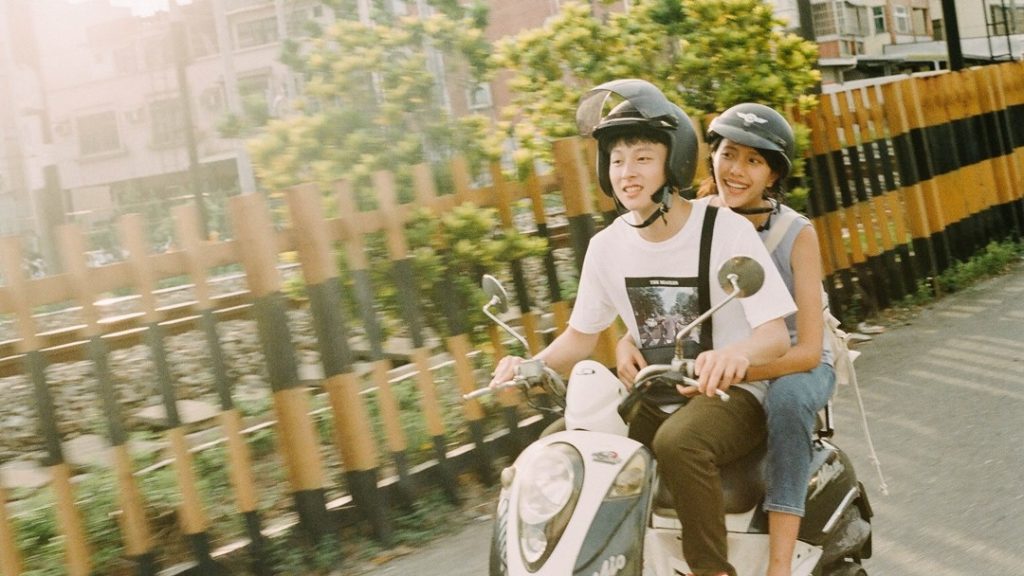
Film still
Hsiao-chun also faces questions regarding her own independence and her financial future, seeing as she did not make it to a public university, and will have to study at a private university—despite the higher tuition cost. Among the merits of the film is its frank depiction of student debt and other issues facing young people in Taiwan today, as well as when young people need to relocate to more expensive cities for college.
Ultimately, my sister proves a feel-good story, with a plot that resolves simply, and in which the hard questions that the film brings up have a clear-cut resolution. But the film’s characterization of Hsiao-chun as a strong and independent young woman, nonetheless plagued by the anxieties that many her age face, is an accomplishment. In this sense, the film is one that accomplishes the aims it sets out for itself.
THE POEM OF PAKISTAN—focusing on Hamid, a young Pakistani immigrant to Hong Kong—is a nuanced and well-shot work.
Hamid is depicted as having come to Hong Kong at a young age, as a fluent speaker of Cantonese that has given up some Muslim customs in order to fit in Hong Kong. He ekes out a living as a banker. Despite living in a cramped and small apartment with his colleague and friend, as part of his job, Hamid maintains the facade of affluence—wearing a counterfeit luxury watch and even refilling a Starbucks cup with home-brewed coffee.
Hamid begins to question himself, however, after encountering a Pakistani family trying to claim a health insurance policy despite this not being the policy that he sold to them. In particular, Hamid begins to question whether he has drifted too far from his roots to find success in Hong Kong.
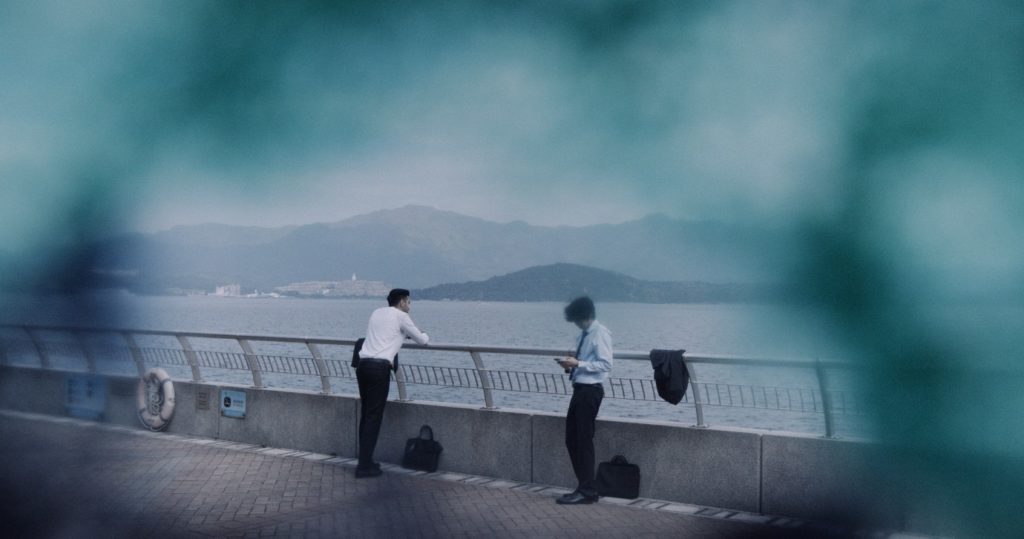
Film still
Hamid’s characterization is one of the accomplishments of The Poem of Pakistan. To this extent, the film’s depictions of Hongkongers’ treatment of Hamid is another accomplishment, such as with regards to his roommate. His roommate is depicted as enraged about some of their other co-workers’ treatment of Hamid, such as ordering pork despite Hamid’s dietary restrictions as a Muslim. At the same time, his roommate can also be prejudiced against Hamid himself, with revealing moments that take place while he is drunk.
The film’s technical merits are worth remarking on. Many shots take unusual angles or are shot with a blurry lens, as though reflective of Hamid’s indecision. Though the story’s conclusion may be a bit too simple, with Hamid deciding to reconnect with his religious roots, the film is perhaps most successful in the many layers of how it depicts the immigrant experience in Hong Kong.
ALL THE CROWS in the World manages to tell a neatly composed, compact narrative of a young Chinese woman’s first encounter with patriarchy through the lens of black comedy.
Sheng-nan, a high schooler, is dragged into a KTV by her cousin, implied to be a sex worker, as her cousin is entertaining a group of businessmen. These businessmen comment on Sheng-nan being the same age as their own children and give her red envelopes, ostensibly for her future education. But when the lights are off, their lecherous natures become apparent, the group comically howling like dogs.
In the course of this, Sheng-nan avoids their advances and is instead drawn to the one member of the group that proves different. As it transpires, this man is gay, but is stuck with the others due to work reasons. The two, then, bond over their distaste for the patriarchal society around them, something that is depicted through a hilarious and well-choreographed dance number.
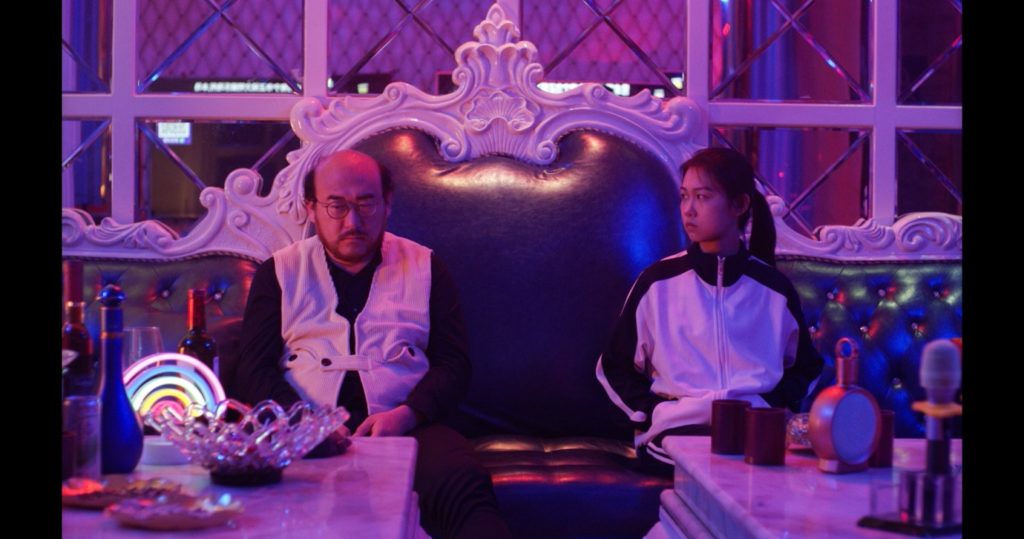
Film still
The implication of the film, in some ways, seems to be that women and LGBTQ individuals should align against patriarchy. According to the director, Tang Yi, the film was based on an actual incident in which she was invited to a KTV where sex work took place by business associates of her father while in high school.
The film works because of the skillful acting of its protagonists, whether Sheng-nan or the group of businessmen, and because of its intricate set pieces. Sheng-nan is a particularly well-developed character, as a young woman thrust into a world of stark patriarchy, but who proves rather prepared to deal with what she encounters.


